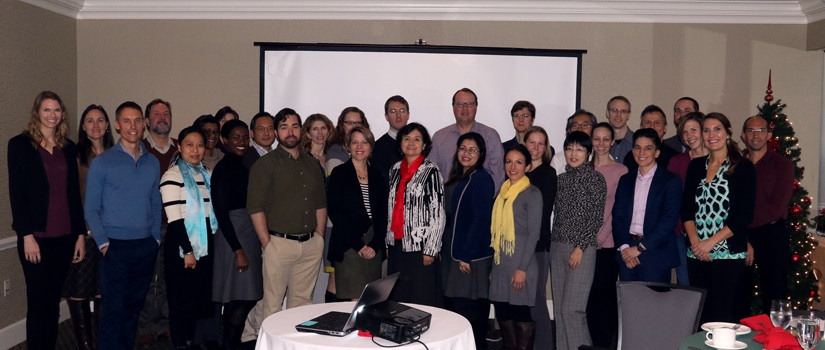December 12, 2017 | Erin Bluvas, bluvase@sc.edu
In 2016, Arnold School researchers published 549 peer-reviewed journal articles and garnered $32 million in extramural funding (both research and non-research) with $24 million of that total secured from federal research funding awards. As the School continues to grow in both students and faculty, the Office of Research provides support to all faculty levels to aid their success in securing research funding.
This fall, the Arnold School launched a new program, the National Institutes of Health (NIH) Proposal Boot Camp. The program includes large group events and workshops [the first workshop, pictured above, took place on December 8] to gain tools and knowledge, peer group activities for sharing ideas, reviewing proposals and providing constructive feedback, and small group work with mentors who have established track records of securing external funding and a commitment to mentoring. The 11-month program is designed to guide faculty in writing high-quality research applications with an initial focus on NIH R01, R03 and R21 grants.
“The Boot Camp is a strategic, proactive and capacity-building investment in one of the School’s most valued assets, the faculty,” says Alan Decho, associate dean for research and co-director of the program along with exercise science professor Michael Beets. “The program is designed to leverage the skills, knowledge and expertise within the School to maintain and increase institutional competitiveness.”
The inaugural 2017-2018 class has been selected from among the applicants, with 22 participants to be mentored by seven mentors from across the Arnold School. At the end of the 11-month period, the mentee will have submitted a high-quality application for an NIH grant.
“The funding climate for NIH right now is very competitive, so I was excited when this program was announced as this model of training has been successfully used at other institutions,” says health promotion, education, and behavior associate professor Brie Turner-McGrievy, who will serve as a mentor. “I know I would have greatly benefited from the structure that this program provides: regular meetings with someone who has been successful at obtaining NIH funding, collaborative feedback from peers, frequent deadlines to have components of a grant completed, and a common deadline for submitting a grant with a group of peers.”
As a mentor, Turner-McGrievy will mentor three faculty members, including exercise science assistant professor Abbi Lane-Cordova, who joined the Arnold School in August for her first academic appointment following four years as a postdoctoral fellow. “I'm looking forward to getting feedback on my grant proposal regarding both content and style,” Lane-Cordova says. “I think getting my work critiqued by both a mentor and colleagues will result in a really nice grant submission that's easy for reviewers to read and understand. I'm also excited about getting tips for grant-writing from people who have ‘been there’ and been successful. Hopefully I can learn from their successes and past mistakes.”
The mentor-mentee relationship is a key component of the program—one that is emphasized throughout all aspects of the Boot Camp. “I hope to help my mentees by connecting them to resources, providing feedback on drafts, and highlighting the many lessons I’ve learned from having submitted NIH proposals over the past decade,” says Turner-McGrievy.
In addition to the practical benefits of mentorship, Lane-Cordova sees it as additional motivation. “Having a mentor, to me, means that I have someone to go to for help who is also interested in helping me,” she says. “It's also a responsibility because I hope to represent my mentor well, too!”
